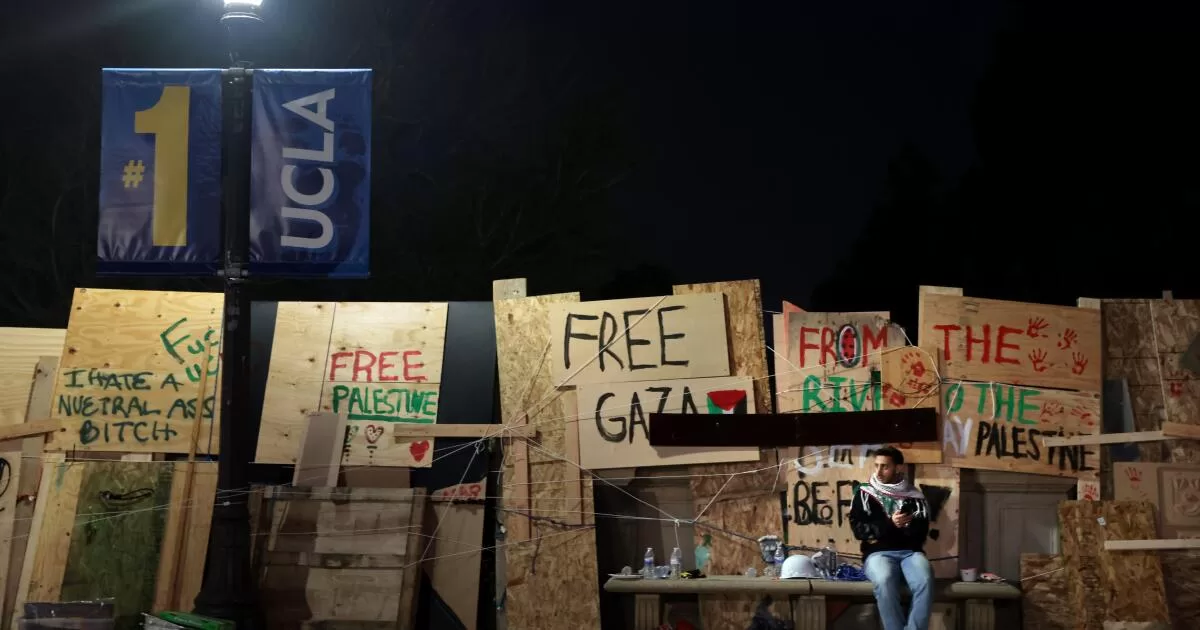Children, parents and medical staff assembled in the courtyard before Al Aqsa Martyrs’ Hospital in central Gaza, with many of them unfurling banners carrying university insignias with “Thank you for supporting our cause.”
Others brandished signs with the words “Your voices pierce the wall of silence and reach the victims in Gaza!,” “The killing of children in Gaza must stop” and “Palestine is everywhere.”
In recent days, as protests and encampments have bloomed in dozens of campuses across the U.S., people in Gaza have taken note of the outpouring of solidarity, both in America and abroad.
They in turn have responded — on social media, in rallies, in videos, by words scribbled on tents — with messages of support of their own. Many view the protests as a positive omen in a time of unrelenting bleakness in Gaza. At another event also in Deir al Balah, others hoped for similar protests to spread in European and Arab countries.
“This was a gathering of thanks and pride for the efforts by students in American universities,” said Baraa Safi, an English teacher interviewed by a local broadcaster on Wednesday.
“It makes a big difference in our lives and it gives us hope that people are still hearing us; that people want to help us, stand with us and end the war we’re living through every day.”
Universities across the U.S. have been rocked since mid-April by demonstrations demanding universities’ endowments divest from Israel-linked investments and companies and calling on Israel to end its bombardment and ground attacks in the Palestinian territory.
Israel’s war on the Hamas militant group has lasted 209 days and has so far killed at least 34,596 people and wounded a further 77,816, according to Palestinian health authorities in Gaza. The figures do not distinguish between civilians and combatants, but officials, aid groups and activists say the majority are women and children.
Israel launched its military offensive in the Gaza Strip after the Oct. 7 attack on southern Israel, when Hamas operatives stormed more than 20 sites in southern Israel, killing roughly 1,200 people and taking about 250 hostage. Slightly more than half of the hostages are believed to remain in Gaza, including 34 that are presumed dead by Israeli authorities.
Israel’s ambassador to the United Nations characterized the campus protests as “the murderous cries of the pro-Palestinian mobs” and castigated universities for allowing “Nazi-like behavior.”
“We always knew that Hamas hides in schools,” Gilan Erdan said in a speech to the U.N.’s General Assembly on Wednesday.
“We just didn’t realize that it’s not only schools in Gaza. It’s also Harvard, Columbia and many elite universities.”
He also accused the U.N. of spreading “anti-Israel vitriol” and said the organization’s “days were numbered.”
The protests in the U.S. have added to domestic and international pressure on President Biden to push through a deal between Hamas and Israel that would end the fighting and release detainees.
On Wednesday, Secretary of State Antony J. Blinken said “there is a proposal on the table” and “the time is now” for a deal. He blamed Hamas for the delay, a charge the group’s leaders denied.
On Thursday, Hamas said its negotiating team would return to Egypt soon for additional talks and a response to a proposal given earlier this week. The group’s chief, Ismail Haniyeh, said in a call on Thursday to Qatari Prime Minister Mohammed bin Abdulrahman bin Jassim Al Thani that Hamas was studying the cease-fire proposal with a “positive spirit.”
Negotiations have stumbled over the permanence of a cease-fire and whether the displaced will be able to return to their homes in Gaza. Mediators have offered a 40-day cease-fire and exchange of Israeli hostages and many Palestinian detainees.
